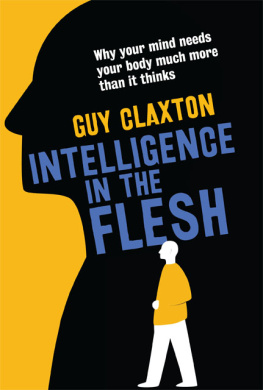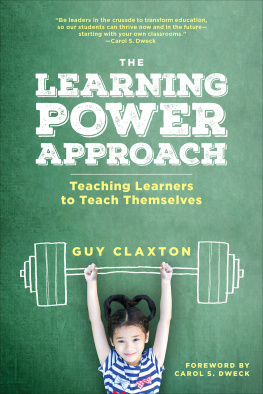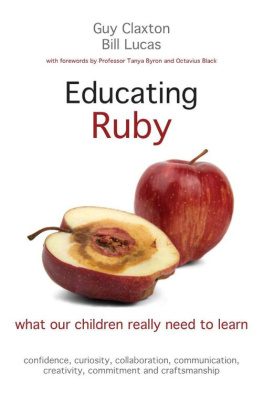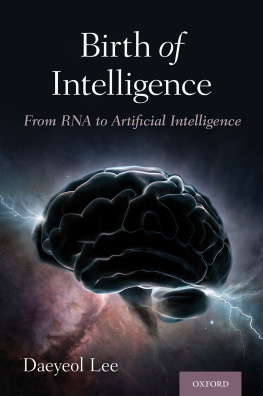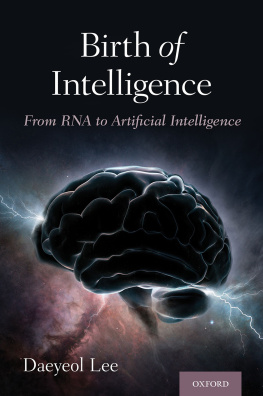

Copyright 2015 Guy Claxton
All rights reserved. This book may not be reproduced in whole or in part, in any form (beyond that copying permitted by Sections 107 and 108 of the U.S. Copyright Law and except by reviewers for the public press) without written permission from the publishers.
For information about this and other Yale University Press publications, please contact:
U.S. Office:
Europe Office:
Typeset in Minion Pro by IDSUK (DataConnection) Ltd
Printed in Great Britain by TJ International Ltd, Padstow, Cornwall
Library of Congress Control Number: 2015940459
ISBN 978-0-300-20882-5
A catalogue record for this book is available from the British Library.
10 9 8 7 6 5 4 3 2 1
We only believe in those thoughts which have been conceived not in the brain but in the whole body.
W. B. Yeats, Essays and Introductions,
Palgrave Macmillan, 1961, p. 235
To Jude, with love
CONTENTS
FIGURES
An example of a Ravens Progressive Matrices type of Intelligence Test.
The robotic Puppy. AI Lab, Dept of Informatics, University of Zurich.
The Yokoi hand. By kind permission of Gabriel Gomez.
The Held and Hein cradle. Both kittens get the same visual experience, but for only one of them is this linked to their own actions.
Seal / donkey illusion.
The integration of Needs, Deeds and Seeds.
A Kanitzsa illusory pyramid.
Titchener circles illusion.
The gerund attacks some peaceful pronouns. From How to Be Topp by Geoffrey Willans, cartoon by Ronald Searle. 1954 Ronald Searle. Reprinted by kind permission of the Ronald Searle Cultural Trust and The Sayle Literary Agency.
How language affects memory. Based on Carmichael, Hogan and Walters 1937 experiment.
Example of the eye-white stimuli, from Paul J.Whalen, Human Amygdala Responsivity to Masked Fearful Eye Whites, Science, 2004.
LIMBERING UP
AN INTRODUCTION
If the body had been easier to understand, nobody would have thought that we had a mind.
Richard Rorty
Over the last century, human beings in affluent societies have become more and more sluggish. Millions of us work in offices, pushing paper, staring at screens, discussing proposals and re-arranging words and spreadsheets. For our leisure, we look at more screens, text and tweet, escape into virtual worlds, gossip and chatter. Some of us still play tennis or knit, but the drift is undeniably chair- and couch-wards. Our functional bodies have shrunk: just ears and eyes on the input side, and mouths and fingertips on the output side. Laundry now involves all the physical skill and effort of pushing clothes through a porthole and pushing a button. Cooking can be no more than ripping off a plastic film and closing the microwave door. Our real bodies get so little attention, and so little skilful use, that we have to make special arrangements to remember them: we program country walks and trips to the gym into our smartphones.
But this is not another panicky book about obesity, heart disease or the dangers of the internet. Nor is it a hymn of nostalgia for the dying arts of quilting and whittling. At the heart of this book is an argument: that we neglect our bodies because we underestimate their intelligence. The problem is not that we have become lazy, or devoid of willpower. It is a matter of assumptions and values. We aspire to cerebral jobs and disembodied pastimes because we have got the idea that those kinds of things require more intelligence than practical, physical things, and consequently they are more highly esteemed in our societies. Crudely, they make us look smarter, and looking smart is good, so doing mind stuff makes us feel good. (Of course, because they are more highly esteemed, they also, by and large, pay more.) Conversely (with a few possible exceptions such as some top athletes) being physically tired, dirty and smelly is associated with a lack of intelligence. So we learn to aspire to being clean and verbal.
We still think about the relative intelligence of body and mind in an archaic and inaccurate way: so says the new science of embodied cognition. Many neuroscientists do not now think that intelligence belongs only to minds, and that the pinnacle of human intelligence is rational argument. They no longer believe that the mind is an ethereal source of control, sent to curb the bodys waywardness and compensate for its stupidity. They do not think that minds and bodies are different kinds of stuff. The idea that bodies are dumb vehicles and minds are smart drivers is old hat. The new science of embodiment has important implications for how we think about ourselves and how we live our lives. This book is a shot at getting that knowledge out there because I think it matters a lot.
The predominant association of intelligence with thinking and reasoning isnt fact; it is a cultural belief a virulent meme, some would call it that misdirects us. Young people who prefer doing intricate things with their bodies breakdancing, skateboarding to doing their maths homework are not lacking in intelligence. I think they are part of a growing cultural rebellion against the hegemony of the intellect (though most of them wouldnt put it quite like that). I hope this book will help their parents and teachers understand why that rebellion is itself intelligent. I hope it might contribute to a wider revaluing of the practical and physical, in education for example, so that those who are not cerebrally inclined will not be led to make the mistake of feeling stupid.
*****
Let me, in this overture, introduce some of the main themes that will emerge as the scientific story unfolds.
The recurring motif is this: we do not have bodies; we are bodies. If my body was different, I would be different. If I was made of silicon or fibre optics, I would need different things, respond to different things, notice different things, and be intelligent in a different kind of way. My mind was not parachuted in to save and supervise some otherwise helpless concoction of dumb meat. No, its just the other way round: my intelligent flesh has evolved, as part of its intelligence, strategies and capacities that I think of as my mind. I am smart precisely because I am a body. I dont own it or inhabit it; from it, I arise.
This realisation is both completely mundane and quite extraordinary. It overturns the accepted, intuitive psychology academics sets the scene for the new view by taking a quick scan back over the evolution of the old view. From classical Greece to the late twentieth century, it was simply inconceivable that a pillar of meat and especially the dull-looking lump of matter inside the skull could have been the source of Euclids geometrical proofs, Platos Republic or Shakespeares sonnets; or that acts of great selflessness and wise judgement could have arisen sui generis from 70 kilos or so of flesh. The smart stuff had, then, to be immaterial and come from elsewhere. The mind was invented to fill what philosophers call the explanatory gap. Consciousness, especially rational thinking, looked to our forebears as if it had to sit in the centre of this hypothetical mind, with the Senses delivering information to it through one bodily door, and Decisions being despatched to the workhorses of the body through an opposite one. We think that we See things, then we Think about them, then we make Decisions, and finally we Act. But its not like that at all.
Next page
